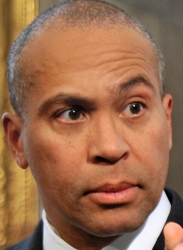Massachusetts governor signs bill legalizing casinos

Now that casinos are coming, the real wagering begins in Massachusetts.
Gov. Deval Patrick on Tuesday signed a highly anticipated bill to legalize three Las Vegas-style casino resorts and a slot machine parlor in the state.
The move opens up Massachusetts to legalized casino gaming roughly 20 years after casinos first began operating in a neighboring Connecticut.
It may also set off a free-for-all for the potentially lucrative casino licenses.
Macquarie Securities gaming analyst Chad Beynon told investors Tuesday it was too early to judge which company could benefit from passage of this legislation.
“Competition for the licenses will be very strong, as almost every major casino company will most likely be in the hunt,” Beynon said in research note. “Jockeying for position has been going on for some time now, as gaming operators and property owners maneuver themselves into the best position.”
The bill, approved last week by the state Legislature, authorizes three casino developments in the Boston area, southeastern Massachusetts and one in any of the four counties of western Massachusetts. It is unclear where the slot machine parlor would be located.
Developers seeking a casino license are required to pay $85 million for the license and invest $500 million into the project. The slot machine parlor would cost $25 million for the license and $125 million for the facility. The 25 percent gaming tax is considered reasonable, since the three licenses are virtual monopolies.
“The capital requirement could keep several smaller regional operators from submitting proposals, given the current state of their balance sheets,” Beynon said.
The Suffolk Downs racetrack in East Boston is expected to seek the license for the Boston market. In April, Suffolk Downs struck a strategic alliance deal with Las Vegas-based Caesars Entertainment Corp. Several casino companies are already jockeying for the Western Massachusetts license. The Mohegan Sun Tribe of Connecticut, Hard Rock International, Penn National Gaming and Las Vegas-based Ameristar Casinos are all exploring the market.
Ameristar announced last week it would acquire a 41-acre site in Springfield to develop a project.
“There aren’t many attractive new market growth opportunities left in our industry, and we believe Springfield, Mass., is the perfect fit for Ameristar,” said Troy Stremming, the company’s senior vice president of government relations and public affairs.
During Penn National’s third-quarter earnings conference call last month, company Chief Executive Officer Peter Carlino said the regional casino operator was exploring Massachusetts. The company has yet designated a site for development.
“I think the project quality is going to count, location and community support is going to count, and ultimately, dollar spend is going to count,” Carlino said. “I think in that situation, we probably will be a major contender. “
Massachusetts is providing the largest piece of gaming expansion since Ohio voters approved four casinos in 2009.
Supporters believe the legislation will create 6,000 construction jobs, 15,000 permanent jobs and generate some $300 million in annual tax revenue for state and local governments.
Patrick has 90 days to choose a five- member gaming commission that will be in charge of approving potential casino developers and selecting the licensees. Casino developers would then have to receive approval in a local referendum before they could begin building their gaming facilities.
Analysts said Nevada’s largest slot machine makers will also benefit from casinos in Massachusetts with an estimated 10,000 games being required to fill the properties.
Contact reporter Howard Stutz at hstutz@reviewjournal .com or 702-477-3871. Follow @howardstutz on Twitter.